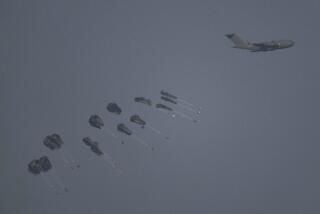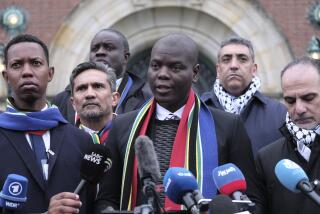A Taste of Justice for Iraq : The U.N. Security Council was right to assume control of oil earnings
- Share via
Anyone inclined to question the need or propriety of this week’s U.N. Security Council action to assume control over Iraq’s oil export earnings might ponder the latest evidence of Saddam Hussein’s warped economic priorities.
A regime that claims it has no money to import food for its citizens has had no problem finding the cash to boost top military pay and benefits, for at least the third time in the last year. About 3,000 senior officers--already among Iraq’s highest-paid employees--have been handed new pay hikes of $300 a month. In addition, this elite group is able to count on cash bonuses, free cars and cheap loans for housing. The point of the generosity is obvious. The military, though much purged, as always remains the only credible potential threat to Hussein’s hold on power. Buying the military’s loyalty is of primary precedence.
Meanwhile, growing numbers of Iraqis are reported to face a rising threat from hunger and disease. The United Nations has already started a food distribution program among Baghdad’s poor. But the magnitude of the danger requires spending hundreds of millions of dollars on food imports. The Security Council has rightly determined that the Baghdad regime can’t be trusted to do what’s needed. The well-merited suspicion is that left to his own, Hussein would simply pour revenues from any resumed oil sales into his military machine, leaving millions of ordinary Iraqis to face starvation. Hence this week’s unprecedented council action.
Iraq’s key trading commodity in effect has been placed under a U.N. trusteeship. Iraq will be allowed to sell up to $1.6 billion worth of oil over six months, but it won’t see a dollar of those earnings. Instead the money will go into a U.N. escrow fund. About $1.06 billion will be earmarked for food purchases, while 30% will be set aside for compensation to the victims of Iraq’s aggression. An additional 5% will help pay for the U.N. commission searching for prohibited weapons in Iraq.
Iraq’s U.N. ambassador decries this plan as neocolonialism. The Iraqi people, who will be its main beneficiaries and for whose welfare the regime so clearly cares nothing, are more likely to regard it as humanitarianism.
More to Read
Sign up for Essential California
The most important California stories and recommendations in your inbox every morning.
You may occasionally receive promotional content from the Los Angeles Times.













